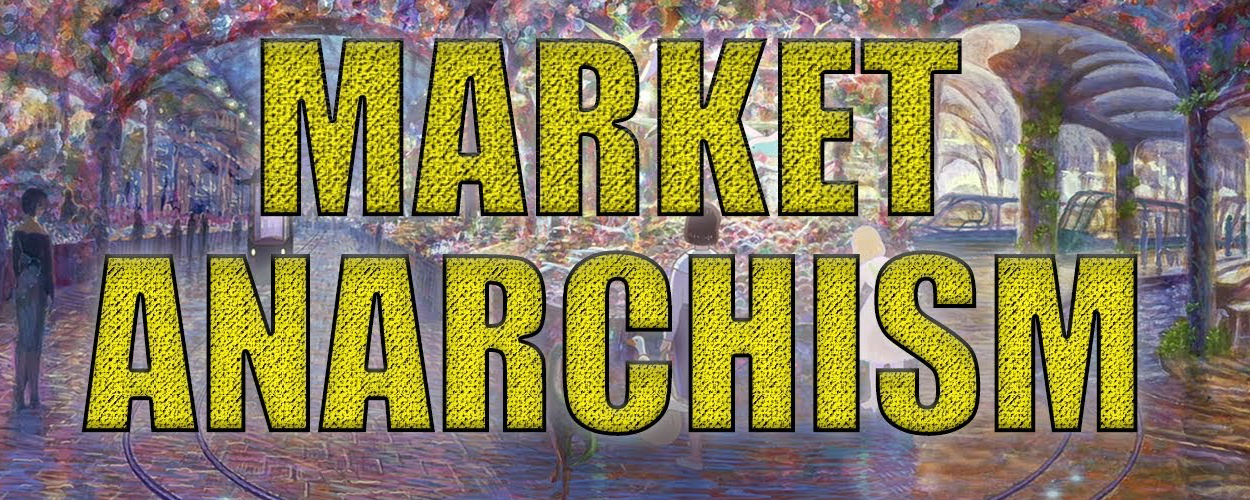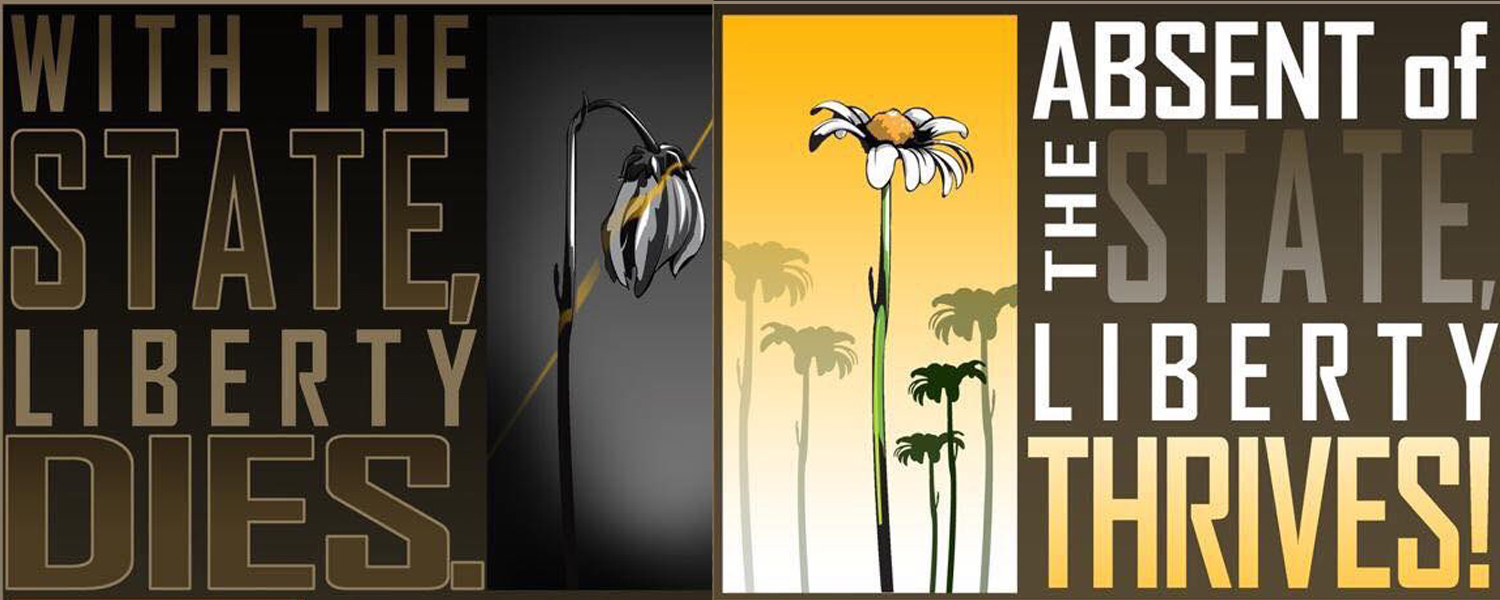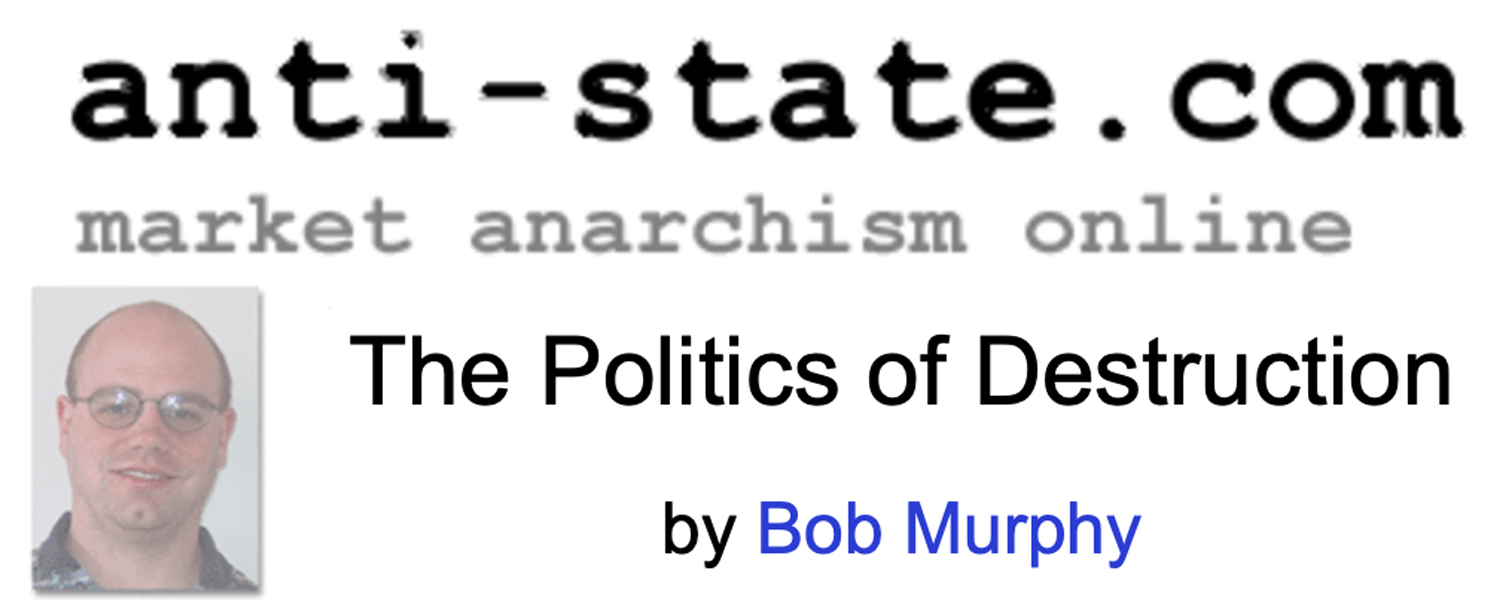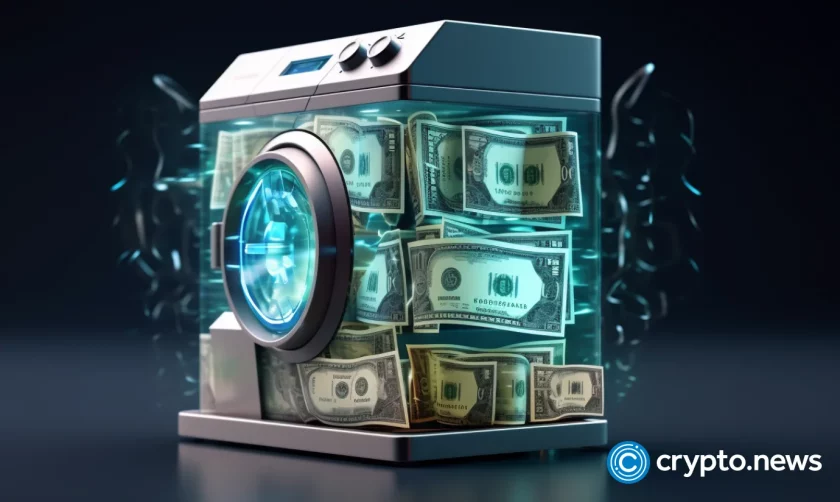For some time now, I have been aware of a widespread fascination among many libertarians with Jim Bell’s “Assassination Politics” (AP). At my request, Robert Vroman has defended the merits of AP. In this article, I will argue that AP is just about the single worst idea that libertarians could advocate. Despite my misgivings, I thank Vroman for his article, so that AP sympathizers may be reassured that I am not attacking a strawman.
**This following article is an opinion piece written by the economist and libertarian author Robert Murphy. “The Politics of Destruction” written by Murphy first appeared on anti-state.com on July 11, 2002, in response to “The Jim Bell System” written by Robert Vroman about assassination politics (AP). Vroman’s intro can be read here, and his response to Murphy’s critique can be read here. Murphy is well known for his work for LewRockwell.com and The Mises Institute, and his personal website at bobmurphy.net.**
Now, before I get going, let me offer a serious note: It’s true, as alluded to by Vroman’s snide remark, that I have recently defended the merits of (qualified) pacifism. I realize that many libertarians find this stance hilarious and indicative of how much of a coward/wuss I personally must be. For the purposes of this debate, let me be clear: I am not at all relying on a pacifist philosophy, but merely the values held dear to most libertarians. I believe that one of the chief attractions of AP is that its proponents can sound like realpolitik tough guys; indeed, I think many people want AP to be practical. But such hopes must be put aside in a sober discussion over whether AP will in fact give libertarians the society they desire.
The Jim Bell System
For those readers who have never heard of Jim Bell’s proposal, and because Vroman abstracted from details that Bell himself deemed essential, let me summarize the original AP vision: (In the following I draw on Parts 1 and 3 of the Bell article linked above, though I have taken some liberties in the interest of clarity.)
There would be two groups of people, the predictors and the patrons. The predictors would submit an untraceable (due to modern technology) “guess” to the AP administrators. The guess would contain an encrypted prediction of the exact date of the death of a certain individual. (The contents of the prediction would be unreadable, not only by the authorities but even by the AP administrators.) The patrons would send (untraceable and anonymous) digital cash donations specifying only the name of a certain individual.
The administrators would hold the donations and publicize the totals accumulated next to each person’s name. Then, after a person on the list died, if anyone had sent in a correct prediction beforehand, he could send in the key needed to decrypt his original guess. The administrators would find that the key worked (i.e. the message would be unscrambled), and they would at that time see that the predictor had in fact correctly guessed the date of death of the deceased. The successful predictor would also specify the public key to be used to encrypt, as a digital cash payment, all of the accumulated donations associated with the now-deceased person.
The appeal of AP is obvious: It would ostensibly allow people to pool their money and finance assassinations of hated political figures. The use of modern encryption techniques would make such financing completely anonymous and risk-free. Because even the administrators would never know the identity of the assassins, there would apparently be no way for the government to crack down on the system.

Now, Vroman has defended AP on two major grounds: First, he claims that it is inevitable; whether we like it or not, AP is coming. Second, he claims that AP should be cheered by libertarians as the source of their salvation.
I dispute both claims. Despite the arguments of Bell and Vroman, I find the AP system completely impractical, and do not think anything like it will ever operate. (This is not to deny that modern encryption and e-currency trends will make traditional assassinations easier to finance. But this will not lead to a mass market in hits placed by the average consumer, which is the hallmark of AP.)
Moreover, I will argue that if AP could somehow be made to work, then it would spell the downfall of modern civilization. The libertarian dream of a free society, where people’s property rights are respected, would be impossible in a world with AP.
Why AP Won’t Work
Supply Side
Although the proponents of AP have done a good job defending it from perhaps the most immediate objections, nonetheless I find the proposal completely impractical. Now, I am no expert in the possibilities of anonymous digital cash payments, so I will concede for the sake of argument that this aspect of the system is as foolproof as Bell and Vroman believe. Even so, I think there are tremendous flaws that would prevent a workable AP system from arising.
My most fundamental practical objection is this: To the extent that AP works as advertised, then no one could possibly use it. That is, if it really were the case that the AP administrators could collect millions of dollars in donations, and funnel them to completely anonymous assassins, then what would prevent the administrators from simply pocketing the money?
After outlining his system, Bell asserts (in Part 3) that, “Potential future predictors are satisfied (in a mathematically provable fashion) that all previous successful predictors were paid their full rewards, in a manner that can’t possibly be traced.” But isn’t this statement contradictory?
Suppose someone sends in a prediction, and takes out the target on the correct date. Then he sends in his claimant message (containing the key to unlock his encrypted guess), which is simply ignored by the AP administrators. Instead these unscrupulous organizers, who have previously flooded their own system with every possible prediction (and “paid themselves” the nominal fee for submitting each guess), act in whatever way is necessary to convince the public that they have paid off the assassin. In such a case, what is the cheated killer going to go? Complain to the police?
(The reason drug dealers can carry on despite the lack of courts and police is that purchasers can inspect the product they’re buying. And whatever mechanisms the AP proponent comes up with to solve this problem – e.g. having a private, underground rating agency to which assassins can complain – what would prevent governments or other groups from registering phony complaints to discredit the system?)
It thus seems to me that the AP administrators themselves would need to be publicly known. Unlike Vroman’s idea of a completely automated system, Bell recognizes this need. In an argument designed to prove that “ethical” AP organizations (i.e. ones that only target “deserving” people) would outcompete unethical ones, Bell says:
Since both organizations will accept donations for “deserving” victims, while only [the unethical one] will accept them for “just anybody,” it is reasonable to conclude that [the latter’s] rates…will be higher for its donations….In addition, [the ethical organization] will become larger, more credible, believable and trustworthy, and more potential “guessers”…will “work” its system, and for lower average potential payments. (Bell Part 6, bold added)
Now, to the extent that an AP system would require name-brand recognition to attract widespread donations, I think it is clear that governments could easily kill it in its infancy. It’s possible that smaller systems could continually spring up after each set of administrators is tortured (much as the court rulings against Napster won’t prevent teenagers from swapping songs), but the ostensible advantage of AP – the ability of hitmen to receive small contributions from millions of consumers – will never be realized.
Incidentally, Bell himself admits that the realization of AP would require martyrdom on the part of the initial administrators. I offer the following as proof (and to show just how poorly Bell understands American society):
Now don’t get me wrong. I’m not suggesting that EVERYONE would be identified. The “donors” to the system would remain perfectly anonymous, and the “guessers” would likewise be perfectly anonymous, but the organization itself would be made up of real people, who have published addresses, who have simply decided that they have had enough of the current system and are going to participate in a PERFECTLY LEGAL enterprise by the laws of the country, and just DARE the government to try to stop them….Suddenly, all the politicians would be put on the spot! Instead of being asked by the reporters for their position on the economy, pollution, the budget deficit, or some other thing, they’ll ask, “Why should the public NOT want to see you dead?” (Bell Part 10, CAPS original)

One of the most immediate responses of the government to the rise of an AP system also proves that Vroman’s idea of an automated administration is unfeasible. Imagine a credible AP system emerges, and the government can’t stamp it out of existence. The first thing that would happen is high-level officials would disappear from public sight (perhaps implementing the “shadow government” plans originally designed to counter nuclear or other attacks on Washington). After they had done this, how would the public know when a particular politician actually died? Even if the politicians inside underground bunkers were still liable to hits from their colleagues, the government would simply lie about the official time of death. So any automated AP system would conclude that the “winning” prediction was, in fact, a losing one, since the computer would have no way of knowing the true date.
Demand Side
Simply put, I don’t think Vroman or Bell realize just how nutty and horrible the AP idea seems to the average American. Especially if the government institutes a standing penalty of, say, a mandatory twenty-five years for placing an AP donation, I don’t think we will have the millions of small donations that AP requires. The situation would be a prisoner’s dilemma: No individual donation of $10 or even $100 is going to make the difference between a target being killed or not, and so there would be no reason for the average person to use AP. The fact that the donations could be made “safely” is not enough; the government would surely institute eavesdropping measures and would punish anyone who even visited AP sites.
As a final note on the impracticality of AP, let me ask, Why hasn’t it happened yet? Bell was discussing the “inevitability” of his system back in 1996. The technology it requires is supposedly already here. So why haven’t the heads started rolling?
Why AP, If it Worked, Would be Horrible
So far I have expressed serious doubts about the practicality of the AP system. But let’s grant for the sake of argument that it could function the way Bell and Vroman believe. I contend that such an occurrence would be horrible from a libertarian perspective, and would, in fact, spell the downfall of Western civilization.
Most obvious, there is nothing in the AP system to restrict its targets to politicians or others “deserving” death. Think of the power the AP option would grant to labor unions (or the NAACP for that matter). Bell claims that his proposal “would make being an abusive government employee an extremely risky proposition. Chances are good that nobody above the level of county commissioner would even risk staying in office” (Bell Part 2). And by the same token, a functioning AP system would make being a cost-cutting corporate executive an extremely risky proposition. Chances are good that nobody above the level of personnel manager would even risk holding his job. At the slightest inclination of a proposed layoff, the shareholders of the company in question would be snuffed out. Business would come to a standstill. To the extent that AP could make coercive government prohibitively costly, so too would it render the system of private property obsolete. (And again, whatever countermeasures the AP advocate proposes to protect private officials, could be used tenfold by government officials.)
Despite its claims, a functioning AP system wouldn’t eliminate government. There are very few people in the world with the skill to execute, say, the Prime Minister of England. The “Mafiosos, Hell’s Angels, Islamo-fascists, McVeigh acolytes, etc., plus a virtually bottomless supply of standard small time thugs and starving junkies,” whom Vroman views as the vanguards of freedom, would be completely unable to penetrate the enhanced security surrounding federal officials in an AP-world, no matter how high the bounties. Rather than delivering us the heads of the masterminds of the New World Order, AP at best would pick off the mid-level bureaucrats.
(The proponent may point out the cliché that no one can stop an assassin who is willing to die. That may be, but if the AP hitman is killed, then the government will know who he is, and will have no qualms in arresting his entire family and circle of friends. So we see that a common claim for AP – that it will allow suicidal assassins to execute contracts and specify beneficiaries to receive the millions in bounties – is foolish.)
The response of Bell and Vroman to this objection (that AP won’t be limited to the “bad guys”) is typical of the flippancy with which they propose mass murder. Vroman says,
Fear not, because AP only recognizes the power of the dollar, and unless someone, somewhere is willing to part with a small fortune in order to doom the [relatively harmless] government peon, he is probably just as safe as every other person listed in the phone book.
In the first place, this is little consolation for the “government peon,” since everyone in the phone book is only a point-and-click away from having a bounty on his head. But more serious, Vroman has here grossly misled the reader: The entire appeal of AP is that it doesn’t require a “small fortune” from anyone; rather, it requires small donations from large numbers of disgruntled people. Presumably, hundreds of thousands of people would be willing to pay $10 to see, say, Eminem or Barry Manilow removed from public service. If Vroman denies the profitability of these assassinations (or of the rude clerk at the local DMV), then he should stop claiming the profitability of hits on government personnel, who will spend millions and even billions of dollars to defend themselves.
(Keep in mind that the primary reasons a person can’t currently take out a contract on, say, his boss after being fired is that (a) he wouldn’t know where to go to hire a trustworthy hitman and (b) the police would know who had a likely motive and would probably be able to discover the identity of the assassin through interrogation. But if AP worked as advertised, someone could place, say, a $5,000 bounty on a regular Joe’s head, and a completely unrelated assassin – who has never even met the financier and is thus completely safe – could fulfill the contract. In the world of AP, people would be dropping like flies.)
In the same vein, Bell pooh-poohs the fear that his system could get out of hand. In an apparent demonstration of his intellectual honesty, Bell tells his reader of an initial worry that he later deemed illusory:
I thought, suppose a person used this system as part of a sophisticated extortion scheme, in which he sends an anonymous message to some rich character, saying something like “pay me a zillion dollars anonymously, or I put out a digital contract on you.” For a while, this one had me stumped. Then, I realized that an essential element in this whole play was missing: If this could be done ONCE, it could be done a dozen times. And the victim of such an extortion scheme has no assurance that it won’t happen again, even if he pays off, so ironically he has no motivation to pay off the extortion….If making the payment can’t guarantee to the target that the threat is removed, he has no reason to make the payment. And if the target has no reason to make the payment, the extortionist has no reason to make the threat! (Bell Part 6)
The visionary Bell has apparently not realized that this same game-theoretic reasoning “proves” why rich people are invulnerable to blackmail and kidnappers.
Ironically, the real reason AP should be anathema to libertarians is that its creation would be the best thing to happen to the government. Look at how much raw power the American people have granted the federal government since the 9/11 attacks. What Vroman and Bell fail to realize is that average people will not look kindly upon the assassinations of the “leaders” for whom they voted in the previous election!

The alleged virtues of AP would allow the government to do whatever it wanted. For example, Vroman believes the AP administrators would have an easier time than drug dealers, since there is no physical evidence. But by the very same token, it would be much easier to frame people on false charges of AP activity. The government could lock up anyone at all, and claim that it had “reliable” evidence of the suspect’s “electronic terrorism.” Civil liberties groups would demand to know what this evidence was, but the government would patiently explain that to reveal such information would compromise its ability to fight the clever AP computer whizzes. Anyone who thinks the public would object is a fool.
(Of course, the government wouldn’t even need to lock up political enemies, and suffer the bother of criminal trials. It could simply take out a contract within the AP system itself.)
On this point, Vroman says:
But then what if the State, facing imminent destruction, lashes out blindly and tries to shut down the friggin internet? Or what if they establish martial law in the scariest uber-polizei-stadt since Adolf was dancing jigs? These and other Orwellian nightmares are possibilities. However, one must consider that any path to anarchism will eventually take us to a point to where the State is cornered and crazed, and thus this is not the fault of AP.
This is simply not true. Even overlooking the breezy dismissal of martial law, we see that Vroman completely misunderstands the role of public opinion in curbing the power of the State. The reason we have enhanced FBI powers this year, rather than last, is that the American people had the crap scared out of them by the 9/11 hijackers. And if AP ever started, the American public would be absolutely scared shitless and would grant the federal government unprecedented powers.
On the other hand, if we adopt the commonplace and admittedly humdrum tactic of persuasion, we can effect a bloodless revolution. The Soviet Union fell without the horrors Vroman claims are inevitable. We can do the same with the American federal government.
Conclusion
Libertarian anarchists must realize that the absence of a functioning government is not a sufficient condition for a free society. As critics are quick to point out, there are “lawless” areas in Colombia and Somalia that have no effective government. And if we look at human society before the rise of the State, we certainly do not see an exact model for the world we desire.
The only way to achieve a truly free society is to convince the vast majority that property rights must be respected with no exceptions. That is, people must realize that theft is theft, even when 51% endorse it. People must come to realize that murder is murder, even when duly elected “representatives” order it – or when thousands of people pay for it.
Any honest proponent must admit that even if AP works as advertised, it will take many years to completely kill off the State. In the meantime, we will have a generation who sees nothing unusual with assassinations of famous people – not just politicians but movie stars, businessmen, models, and anyone else envied or hated by the masses. Such a society could not possibly believe in the sanctity of property rights, or take seriously the non-aggression axiom.
I will close with an analysis of Vroman’s response to this objection:
If society degenerates to the point that putting a $100 bet on someone dying tomorrow results in a very real possibility that you will be right, then this would imply that AP players are so widespread and killing so unremarkable, that you might as well just whack the person yourself and save the C-note. At this point, AP will fall into disuse for being an unnecessary middleman in the homicide business, except for those rare hard to find targets, as was its original purpose. Therefore, AP has a feedback loop that prevents it from being practical as a means of facilitating petty murders.
And by the same token, if we were to achieve anarchy by using nuclear devices to wipe out all the politicians (as well as millions of innocent people and modern civilization), then the survivors would find the further use of nuclear devices impractical.
What do you think about Robert Murphy’s essay ‘The Politics of Destruction’? Let us know what you think about this subject in the comments section below.
Op-ed Disclaimer: The opinions expressed in this article are the author’s own. Bitcoin.com is not responsible for or liable for any opinions, content, accuracy or quality within the Op-ed article. Bitcoin.com is not responsible, directly or indirectly, for any damage or loss caused or alleged to be caused by or in connection with the use of or reliance on any information in this Op-ed article. This article is a reprint of an archived editorial that was originally published on July 11, 2002.
Image credits: Shutterstock, anti-state.com archive links, Pixabay, Fair Use, and Wiki Commons.
Want to create your own secure cold storage paper wallet? Check our tools section. You can also enjoy the easiest way to buy Bitcoin online with us. Download your free Bitcoin wallet and head to our Purchase Bitcoin page where you can buy BCH and BTC securely.





